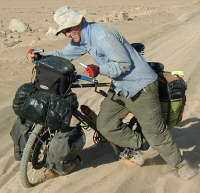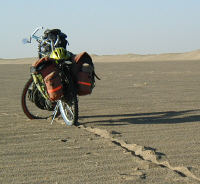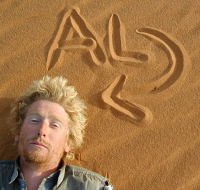Aswan, Egypt to Khartoum, Sudan
(1st March 2002)
“Never forget where you’ve come here from”
– Take That
Deciding to cycle round the world was a decision prompted by heady notions of adventure, challenge and self-discovery. Five months on the road had quickly rotted those glossy illusions. The sickly-sweet ‘qualities’ that litter and light up job application letters had decayed to the sordid bones and leering skull of reality: the only thing keeping me going now was stubbornness, fear of failure and sheer bloody mindedness. No doubt though if I make it to Cape Town the show-boating glamour traits will re-appear once again to grab the glory.
The ferry from Egypt to Sudan should leave at 3pm. At 4pm the doorway, gangplanks and jetty were still all packed solid with sacks waiting to be loaded. Absolute chaos. Heavy sacks were dumped on top of boxes of soft fruit, rainbows of stacked plastic chairs jumbled amongst bags of already spilling sugar. Someone had happily raided an industrial sized box of chocolate wafers. The irate captain liberally sprinkled the workers with clouts ’round the head as they heaved and shouted and pointed at the never-shrinking mountain of cargo on the dock. Somehow I had heaved my bike through the scrum and had seized possession of a small strip of bare deck. It was to be my home for the next 24 hours (plus however long we were delayed whilst the weekly debate of how best to convey a sack through a door raged on) and I was ready to defend it bravely from encroaching piles of cargo and the really fat bloke (who MUST have been the one raiding the chocolate wafers!). If I should die, think only this of me…
The sun set. Eventually the tumult and the shouting died; the captain and his ship could depart. 9:30pm. Below deck degenerated fast. Amongst the old suitcases and cardboard boxes tied with string were squashed hot families, sprawled comatose, shrieking, playing dominos (out here a VERY noisy sport, often verging on full contact), sleeping, eating, stretching or scratching. Food was served in the canteen by the dirtiest man I have ever seen, his squalid clothing glistening with grease, fag ash sprinkling from his mouth into the food like an Italian chef lovingly seasoning with oregano, his vast belly a testimony to never having to eat his own vile cooking. A cheap tin tray was banged down on the counter and the dirty man scooped onto it a handful of grey chopped tomatoes, a handful of grey boiled beans, a grey egg and half a (surprisingly orange) orange. I returned to deck to escape the heat and noise and stench. For the canteen was by the toilet, already unrecognizable by that title. A more swilling, reeking, badly aimed swamp of human excrement and excess I have never seen. But on deck the night sky was beautiful.
I met some other cyclists on the boat! Owy, Paul, Ruth and Toby are cycling through Africa to the Earth Summit in Johannesburg. They left the UK three months after me and have already caught me up. Their sponsored bicycles, laptop computer, video camera and solar panel make me look very amateur. However their complete inability to decide how to make custard reassured me of their mortality!


Arriving in Wadi Halfa was one of the most exciting events on this journey. Never in my life have I been to such a boring little town, but I was in the Sudan at last!
Before I could begin to cycle I had to register with the police and obtain a permit to travel in the country. This involved being waved vaguely in the direction of many different identical offices in search of elusive stamps, signatures, counter stamps, confirmatory signatures, payments, stapling, bewildered expressions and shiny purple dossiers. Several hours later the trail of offices appeared to dry up: it seemed as if I was free to go.
Befuddled and exhausted, I climbed a small hill to watch the sun set. The blue waters of man-made Lake Nasser seemed to invade this end-of-the-world, needle-in-a-haystack, middle-of-nowhere place, bringing a ferry and a weekly splash of activity into the silence of the desert. Wadi Halfa is an odd place to have on a list of ‘highlights’: a few clusters of square single-storey dwellings, sand coloured and bleak as all the world appears to be from up here. It is a town featureless like snowfall – no paths or roads, no trees, no colours, no contours. I wonder which route I will take across the desert but I can see no clues or tracks. However, in the warm light I realise that Wadi Halfa is a highlight for the very fact that it is the most remote place I have ever been to. I pause to remember and to thank in my mind all the people and places who have combined over the years to have got me as far as this, to this small hill in this torpid backwater at the northern tip of the largest country in Africa.


My backside is bruised, my spine compressed by several inches and my neck is whip lashing dangerously but I am delighted: the corrugated ‘road’ out of Wadi Halfa is far better than I had feared. When the rattling becomes overbearing I venture off into the sand, following my nose in search of hard ground. I hit soft sand, my legs spin like a Dervish, the tyres slip and slide and I slew uncontrollably through deep powder. Direction of travel becomes entirely random. When the sand is too deep I push the heavy bike through the drifting sand – laden with three days supply of food and water, this is not as easy as it sounds. Even pushing is often impossible and then I have to pull the load instead. Hard work.
I lie on my back in the sand, crusted with dirt and salty sweat. A hot wind wipes across the land cracking my lips into a smile. Barefoot in the desert of Sudan. At night the oppressive heat dissolves and the stars seem even more exotic through the tickling folds of my mosquito net draping down over me from my bicycle.
Sometimes I fear that I claim things to be tough when perhaps it is just me being a wimp. So I was able to derive some grim satisfaction from my bike frame snapping. I wiggled the jagged steel tubing masochistically like a wobbly tooth and then started walking. Fortunately it was only about 20km before I came across a kind bed maker who welded the metal together (I chose not to watch as he gleefully and crudely fried poor Rita!), refused payment, fed me and sent me off with a large bag of cookies (he was also the local baker). A snapped frame in the desert classifies as ‘not good news’. There is no way the bike will survive to Cape Town: I just prayed it would get me as far as Khartoum… Otherwise I was in for a long walk.
I wake on the riverbank at sunrise on Valentine’s Day. As is traditional, the postman did not arrive bearing gifts from secret admirers. Even 6000 miles from home some things do not change!
I buy tea, the price established between us by writing with our grubby fingers in the sugar bowl. The price agreed, I seal the deal by digging my spoon into the bowl and scooping out sugar to sweeten my drink.
For Alice in Wonderland the rule was “jam tomorrow and jam yesterday, but never jam today”. But my diet is even more depressing than hers. Bread and jam every single day then pasta and a stock cube for dinner. I crave fresh food (not to mention pies, ice cream, burgers and a MiniDisc player!). My culinary highlight is a new box of stock cubes or a new flavour of jam. Roll on Khartoum.
After days and days of quiet, arriving in Dongola is unsettling – from nothing into crowds of men flowing past in white robes and turbans, visions of noisy ghosts. A deeply black young woman is swathed in blue, ceremonial scars framing her piercing white eyes. She looks at me and through me, her haughty dignity and poise mocking me to lower my eyes and break the gaze that seems to bore deep into my mind and my past. A teenage girl prepares tea, henna tattooed hands gracefully working through billowing robes of green and gold. Deftly she fills delicate thimble shaped glasses, the chestnut coloured tea misting the tops of the glasses as tiny jewels of condensation run back down into the dark sweet tea. On every corner in every village pose characters from National Geographic photo-shoots. Beauty, grace, wisdom, dignity: all the characters are here, laconically leaning in the jaunty painted doorways of Northern Sudan.
A squad of six trainee soldiers marches in the desert, perfectly out of step and uniformed in a hotchpotch of shorts, tattered T-shirts and flip-flops. They are a shambles. Sergeant Major style I bellow “Eyyyes Right!” and throw them my crispest salute, much to their amusement.
The bicycles of Sudan put mine to shame with their spectacular tacky decorations: frames striped with coloured tape and a cornucopia of aerials, bells, laser beam noise machines, wing mirrors (at least 4), large mud flaps (mud? Sudan?) with flourishes of dangly stuff and jangling Pepsi caps, frilly things in the wheels, tassels on the seats and often a huge chrome headlamp too (broken). They are normally ridden by small boys who can barely even straddle the crossbar let alone sit on the saddle.
Edward Gibbon wrote that he was “never less alone than when completely alone”. He had clearly never hauled a bike through miles of shimmering virgin sand, alone as far as the horizon in every direction, in search of an elusive road. The blood roared through my head and stars danced in my eyeballs. Even my singing could not disguise the brutal silence. I felt very alone. It was a Long Drag.
As ever, the final stretch of the stage degenerated into silliness – riding all day and then right through the night as well, desperate to reach Khartoum and civilisation and to avoid another midday in the desert glare. Beneath shooting stars the night air was cool and fresh. I arrived in Khartoum early, as the yolk-like sun began sliding up once more into the frying pan sky of Sudan. I’ve made it!


Three weeks without showering or changing my clothes has left my clothes festering and torn to shreds. I am thoroughly sick of moldy bread and jam. I am desperate to hear music once more. My bike has snapped. But even as my kind host tactfully pointed me towards the shower I could look past all the struggles to see and feel the relief of success, the warmth and grace of a charming people, the privilege of silent sunrises over the Nile and the satisfaction of lying on my back in the hot sand, sun baked and filthy, a cracked smile on my grubby face in the hot, gritty desert wind.
I have made it to Khartoum.